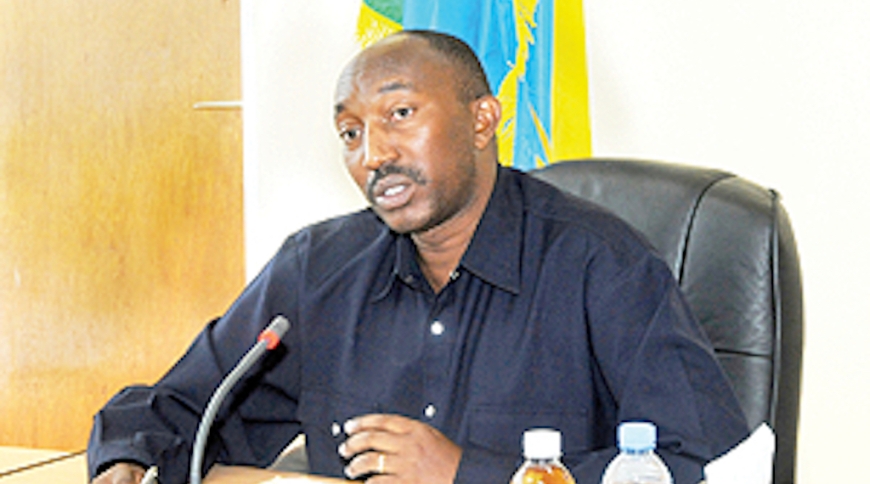Rwanda: 3,800 women in Rwanda have had their uterus removed in four years
by admin on | 2025-01-16 07:24:05
Share: Facebook | Twitter | Whatsapp | Linkedin Visits: 38

Figures from the National Institute of
Statistics, NISR, show that in the last three years until 2023, 3,861 women
underwent hysterectomy, due to various problems.
NISR shows that in 2020 there were 1,138
uterus removals in 2021 and slightly increased to 1,152 in 2022 and decreased
to 685 in 2023 and increased again to 886.
A hysterectomy is performed on a person due
to problems in the reproductive organs, and it is considered as the last
decision to protect his life because there is no other way to take care of him.
After that, neither the woman nor the girl
will get her period again, nor will she get pregnant again.
A specialist in gynecology, who works at
the 'La Croix du Sud Hospital' in Nyirinkwaya, Dr. Niyonzima Jean Pierre, told
IGIHE that some of the reasons that can lead someone to remove the uterus are
tumors known as 'myomes'.
It gets so big that you find it
difficult to pull out one at a time and decide to have the uterus removed,
especially as someone in their 40s with children," he said.
He said that these tumors are not
cancerous, however, even if people are diagnosed with cervical cancer or
uterine cancer, if they are detected early, they can remove the uterus.
He said that another reason is when a
person is giving birth, the uterus bursts, it breaks so much that it is
impossible to put it back together, and the last decision is to remove it.
According to Dr. It is difficult to
emphasize.
He said, “You find that it's gone like an
illegal place, the uterus is pierced and you see that it looks like it's
rotten. There are others who are at risk after giving birth to the uterus,
which will have 'infections' and rot those who we grow up with.
When asked about the allegations that a
person may be having sex with a man who has sex for a long time, causing the
uterus to be damaged, Dr. Niyonzima said it is impossible “because the uterus
is closed. It has a point that descends [in the female genitalia] called the
'col de l'uterus' and it might harm you."
He continues, “Only sexually active people
do not even have cervical cancer. It is where they bleed, like those who have
been raped or men who have taken other drugs and so on."
In regards to people who want to undergo
voluntary hysterectomy, Dr. Niyonzima said that although it is possible to deal
with other dangers that a person may have, it is impossible for someone to
carry it just like that because it is a very difficult task to be loved and
that there may be different dangers.
Even if the hysterectomies are no longer
able to conceive, Dr. Niyonzima said that if they have sperm in them, it means
that he can give birth with the help of technology, some of the sperm will be
taken from a person and they will put it in another person who will be
pregnant.
He said, "Those are the ones who will
benefit from the law that a person can claim someone else because they actually
have sperm but they will not find a place to grow, it is not possible for him
personally."
In August 2024, the method of surrogacy was
introduced into Rwandan law.
It is done by taking the eggs of a woman
and a man and combining them in the laboratory and then the egg is placed in
the uterus of another woman and we are called the owners.
Now the family can make a contract with
another person and the child will be theirs.
The Law on People and Family published on
July 30, 2024 provides that married couples can reproduce naturally or
technologically between a man and a woman.
The second paragraph of Article 279 states
that "Technological reproduction of a married man and woman can be done
between them and another person who has entered into an agreement according to
the law."
It states that the mother of a child born
through technology "is the signatory to the agreement regarding the
technology of reproduction."
Surrogacy is a popular method in developed
countries, where the statistics of the American Society for Reproductive Health
of ORM Fertility, show that at least 4000 such operations take place every
year.
In maintaining health and preventing a
person from having a hysterectomy, Dr Niyonzima points out that people should
go to the doctor early so that these problems can be avoided.
He said, “The reason for such tumors
growing to the point where a person has to remove the uterus, is that he did it
and it stayed if I did not get checked. If the stomach is too big, there are
heavy periods and so on, he should go for a check-up."
He emphasized that people should avoid
unplanned pregnancies, but even those who have it for various reasons, there is
no need to seek illegal services, but they should go to the doctor and see what
can be done to protect their health.
As a specialist in gynecological diseases,
Dr Niyonzima points out that often apart from 'infections', problems with missed
periods, irregular periods and infertility are among the most common
gynecological diseases. more than others.
Apart from hysterectomy, NISR figures show
that 75,158 gynecological or obstetric surgeries were performed in 2023, up
from 78,045 in 2022. In 2021, they were 77,694, while in 2020, they were
70,200.
The majority of those who gave birth were
70,090 in 2023 and 73,446 in 2022, 73,677 in 2021 and 65,329 in 2020.
Uterine tumor surgery in 2023 amounted to
764. Those who underwent tumor surgery also increased because in 2022 they were
450 in 2021 and 645 while in 2020 they were 562.
Others underwent lower abdominal surgery
due to various diseases, such as removal of certain parts, increased
significantly from 2000 in 2023 to 1154 in 2022, while in 2021 they were 548
and in 2020 they were 533.
In 2023, there were 111 people who were
operated on for the correction of oculopathies, from 136 in 2022. In 2021,
there were 199 people who were operated on for oculopathies, and from 209
people who were operated on for this problem in 2020.
The number of women who underwent screening
for cancer and other diseases in 2023 increased from 499 in 2022 to 315 in 2021
and 511 in 2020.
While the number of gynecological surgeries
that were not reported was 518, however, there was a significant decrease. The
reason is that in 2022 there were 1675 from 1158 in 2021, while in 2020 there
were 1918.
Marc N.
Previous News
Ghana: Captain Traoré carrying a gun at the inauguration of the
President of Ghana is causing concern
https://andika.rw/news-details.php?nid=205
Rwanda: Closed temples are
about to be opened
Leave a Comment
Search
Recent News
-
 Idiot student
Idiot student
-
 A brave child. For 8 years he raised his mother like a baby, bathed her and did everything for her.
A brave child. For 8 years he raised his mother like a baby, bathed her and did everything for her.
-
 King Charles III of England was diagnosed with Cancer
King Charles III of England was diagnosed with Cancer
-
 Some of African countries and their nicknames
Some of African countries and their nicknames
-
 all to know about the ancient human being in 75000 years ago
all to know about the ancient human being in 75000 years ago
-
 Is it really a sin for Christians to listen to songs of non- Christians? That is what the Bible says about it
Is it really a sin for Christians to listen to songs of non- Christians? That is what the Bible says about it
-
 Ruhango: They were surprised to see the man they had buried the night before and he told them that he was not dead and that they had buried him instead of him!
Ruhango: They were surprised to see the man they had buried the night before and he told them that he was not dead and that they had buried him instead of him!
-
 A man from the United States has been accused of killing his wife because he could not afford to pay for her hospital.
A man from the United States has been accused of killing his wife because he could not afford to pay for her hospital.
Popular News
- King Charles III of England was diagnosed with Cancer
- hOW TO CHECK THE RESULTS OF P6 AND SENIOR THREE CANDIDATES
- A brave child. For 8 years he raised his mother like a baby, bathed her and did everything for her.
- Researcher "Chilingarov who has done a lot of research on the parts of the world has passed away"
- Idiot student
Top Trending
-
 Idiot student
Idiot student
-
 A brave child. For 8 years he raised his mother like a baby, bathed her and did everything for her.
A brave child. For 8 years he raised his mother like a baby, bathed her and did everything for her.
-
 King Charles III of England was diagnosed with Cancer
King Charles III of England was diagnosed with Cancer
-
 Some of African countries and their nicknames
Some of African countries and their nicknames
-
 all to know about the ancient human being in 75000 years ago
all to know about the ancient human being in 75000 years ago
-
 Is it really a sin for Christians to listen to songs of non- Christians? That is what the Bible says about it
Is it really a sin for Christians to listen to songs of non- Christians? That is what the Bible says about it
-
 Ruhango: They were surprised to see the man they had buried the night before and he told them that he was not dead and that they had buried him instead of him!
Ruhango: They were surprised to see the man they had buried the night before and he told them that he was not dead and that they had buried him instead of him!
-
 A man from the United States has been accused of killing his wife because he could not afford to pay for her hospital.
A man from the United States has been accused of killing his wife because he could not afford to pay for her hospital.